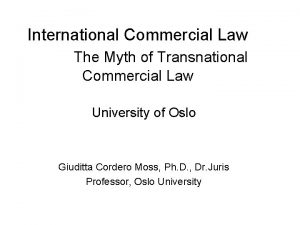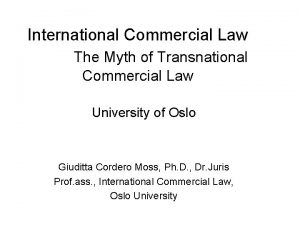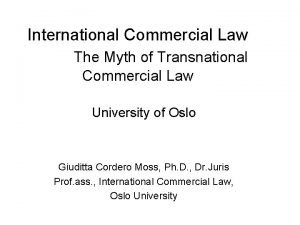International Commercial Law the CISG Prof Giorgio F



















- Slides: 19

International Commercial Law – the CISG Prof. Giorgio F. COLOMBO

Damages (II) Lesson n. 13

Duty to mitigate damages � Art. 77 CISG � A party who relies on a breach of contract must take such measures as are reasonable in the circumstances to mitigate the loss, including loss of profit, resulting from the breach. If he fails to take such measures, the party in breach may claim a reduction in the damages in the amount by which the loss should have been mitigated

Duty to mitigate damages � The CISG does not forgive a passive attitude towards losses � The aggrieved party has the duty to mitigate damages � If it fails to do so, the measure of damages may be reduced proportionally

Examples �A Swedish Buyer purchases from a Spanish Seller 50 tons of oranges for the price of 600 EUR/ton � According to the contract, shipping must be taken care of by Seller � Upon arrival to the port, Seller finds out that the ship it had contracted for is not available � Seller asks for Buyer’s assistance, because it knows it normally uses that port and has contacts with storage facilities there

Examples � Buyer refuses to provide assistance. It says that a) securing a ship was Seller’s responsibility and b) the storage facilities available asked for a a storage price of 45 EUR/ton the Buyer had to pay upfront � As a result of the lack of proper storage, the oranges rot in the containers � Buyer brings legal action against Seller for the failure to delivery

Examples �A German Buyer purchases from a French Seller 50, 000 swimsuits for the 2015 summer season � The product are to be manufactured according to the design provided by the Buyer � Under the contract, the swimsuits are to be produced in the period 1 -30 april 2015 (2, 000 pieces a day not including holidays) and delivered in consecutive shipments as they are ready

Examples � Upon receiving the first package (2, 000 pieces) on April 6, Buyer finds out that the swimsuits are different from the design thy provided � The second shipment (April 7) has the same non-conformity � The third shipment (April 8) as well � Upon receiving the fourth shipment (April 9), Buyer notifies Seller that the design is wrong and the swimsuit are unacceptable

Examples � Seller stops the production on the same day � Buyer brings legal action against Seller, based on the lack of conformity � Seller acknowledges its responsibility, but it refuses to reimburse the price for 6, 000 swimsuits � Seller complains that, had the Buyer informed it on April 6, it would have stopped the production immediately

Exemptions � Art. 79 � (1) A party is not liable for a failure to preform any of his obligations if he proves that the failure was due to an impedimenti beyond his control and that he could not resonably be expected to have taken the impediment into account at the time of the conclusion of the contract or to have avoided or overcome it or its consequences

«Force Majeure» � Compromise between the principles of strict liability (Common law) and liability-at-fault (Civil law) � Requirements: ◦ ◦ ◦ Beyond control Unpredictable Special rules in case of third-parties Timeframe Notice

Examples � An American Seller and a Romanian Buyer enter into a contract to supply 15, 000 kgs of chicken legs � Shipment is to be made between June 1 and June 15, 2006 � On June 2, 2006, the Romanian Government bans all the import of chicken meat because of the avian flu outbreak � Only shipments certified before June 7, 2006 will be allowed

Examples � The Seller is unable to complete all the shipping operations before June 7, and therefore 7, 500 kgs are not certified before the date � Buyer therefore proposes Seller to change the place of delivery to Bulgaria, and then Buyer would take care of the matters � Seller, however, refuses, as the change of destination would imply also the change of documents, etc.

Examples �A German Buyer purchases from a Swiss Seller 60 metric tons of Triethylen Tetramin (TETA) � The Seller informs the Buyer that they do not have stock, and they will procure the goods from a supplier in Italy � After the contract is entered into, but before delivery is due, the Italian Governement unexpectedly puts restrictions on the sales of TETA

Examples � The Seller therefore declares their intention to cancel the contract � The Buyer, however, urges the Seller to identify another supplier and proceed with the delivery

Force Majeure - Hardship � Hardship is usually defined as the financial inability to perform a contract � It does not necessarily mean that the performance is impossible, but it has become problematic or unprofitable because of a change in the circumstances � Would that be a ground for non-performance under Art. 79?

Examples �A Dutch Buyer purchases from a French Seller a number of contracts for the purchase of steel tubes � After the contracts have been concluded, the price of steel unexpectedly increases by 70% � In the contracts there is no price-adaptation clause

Examples � The Seller refuses to perform, as the performance would result in a huge financial loss � The Buyer brings legal action against the Seller to obtain the performance

Exemptions � Art. 80 � A party may not rely on a failure of the other party to perform, to the extent that such failure was caused by the first party’s act or omission � E. g. Documents, down payments, etc.
 Cisg international købelov
Cisg international købelov Risikoovergang
Risikoovergang Cisg scope of application
Cisg scope of application Uncitral model law on international commercial arbitration
Uncitral model law on international commercial arbitration Uncitral model law on international commercial arbitration
Uncitral model law on international commercial arbitration Commercial and non commercial food service
Commercial and non commercial food service Newton's first law and second law and third law
Newton's first law and second law and third law Newton's first law
Newton's first law Boyles law
Boyles law Constant of avogadro's law
Constant of avogadro's law Commercial law outlines
Commercial law outlines Define commercial law
Define commercial law Commercial law rmit
Commercial law rmit Giorgio gribaudo
Giorgio gribaudo Giorgio chiarelli infn
Giorgio chiarelli infn Segundo john rawls a noção de justiça comporta
Segundo john rawls a noção de justiça comporta Giorgio cannavicci
Giorgio cannavicci Limerick esempi
Limerick esempi Giorgio joyce
Giorgio joyce 1941-1882
1941-1882



































